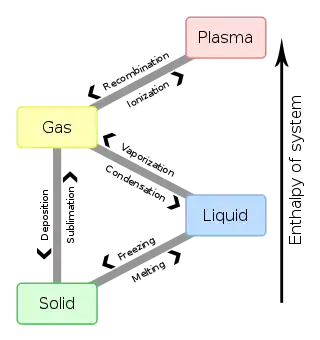Enthalpy of sublimation
The enthalpy of sublimation, or heat of sublimation, is the heat required to change one mole of a substance from solid state to gaseous state at a given combination of temperature and pressure, usually standard temperature and pressure (STP). It is equal to the cohesive energy of the solid. For elemental metals, it is also equal to the standard enthalpy of formation of the gaseous metal atoms.[1] The heat of sublimation is usually expressed in kJ/mol, although the less customary kJ/kg is also encountered.
Sublimation enthalpies
| symbol | substances | Sublimation enthalpy (kJ/mol) |
|---|---|---|
| Na | sodium | 108 |
| K | potassium | 89 |
| Rb | rubidium | 82 |
| Cs | caesium | 76[1] |
| Mg | magnesium | 148[1] |
| Ca | calcium | 178[1] |
| Sr | strontium | 164[1] |
| Ba | barium | 180[1] |
| I2 | iodine | 62.4[2] |
| C10H8 | naphthalene | 72.9[2] |
| CO2 | carbon dioxide | 25[2] |
References
- Oxtoby, D. W; Gillis, H.P., Butler, L. J. (2015).Principles of Modern Chemistry, Brooks Cole. Appendix D. ISBN 978-1305079113
- Chickos, James S.; Acree, William E. (2002). "Enthalpies of Sublimation of Organic and Organometallic Compounds. 1910–2001". Journal of Physical and Chemical Reference Data. 31 (2): 537–698. doi:10.1063/1.1475333. ISSN 0047-2689.
This article is issued from Wikipedia. The text is licensed under Creative Commons - Attribution - Sharealike. Additional terms may apply for the media files.
